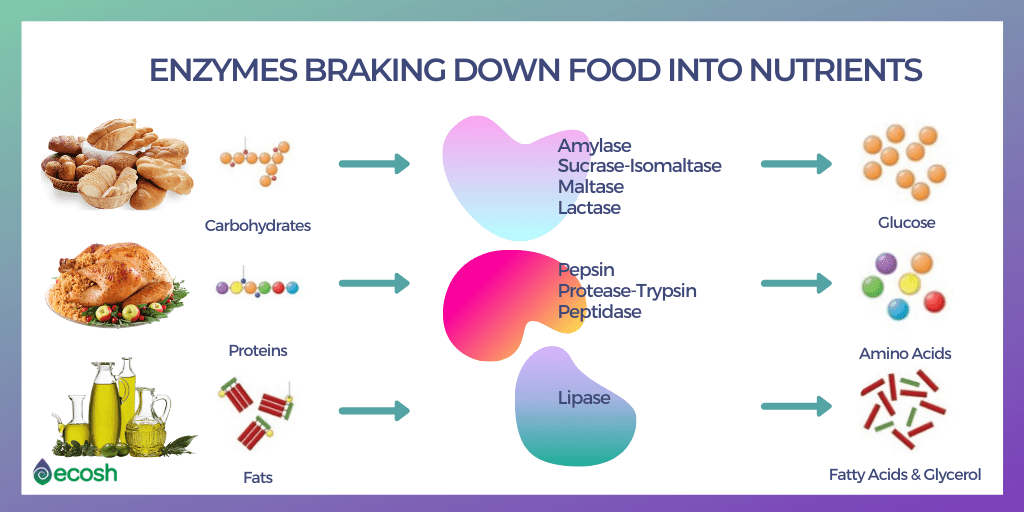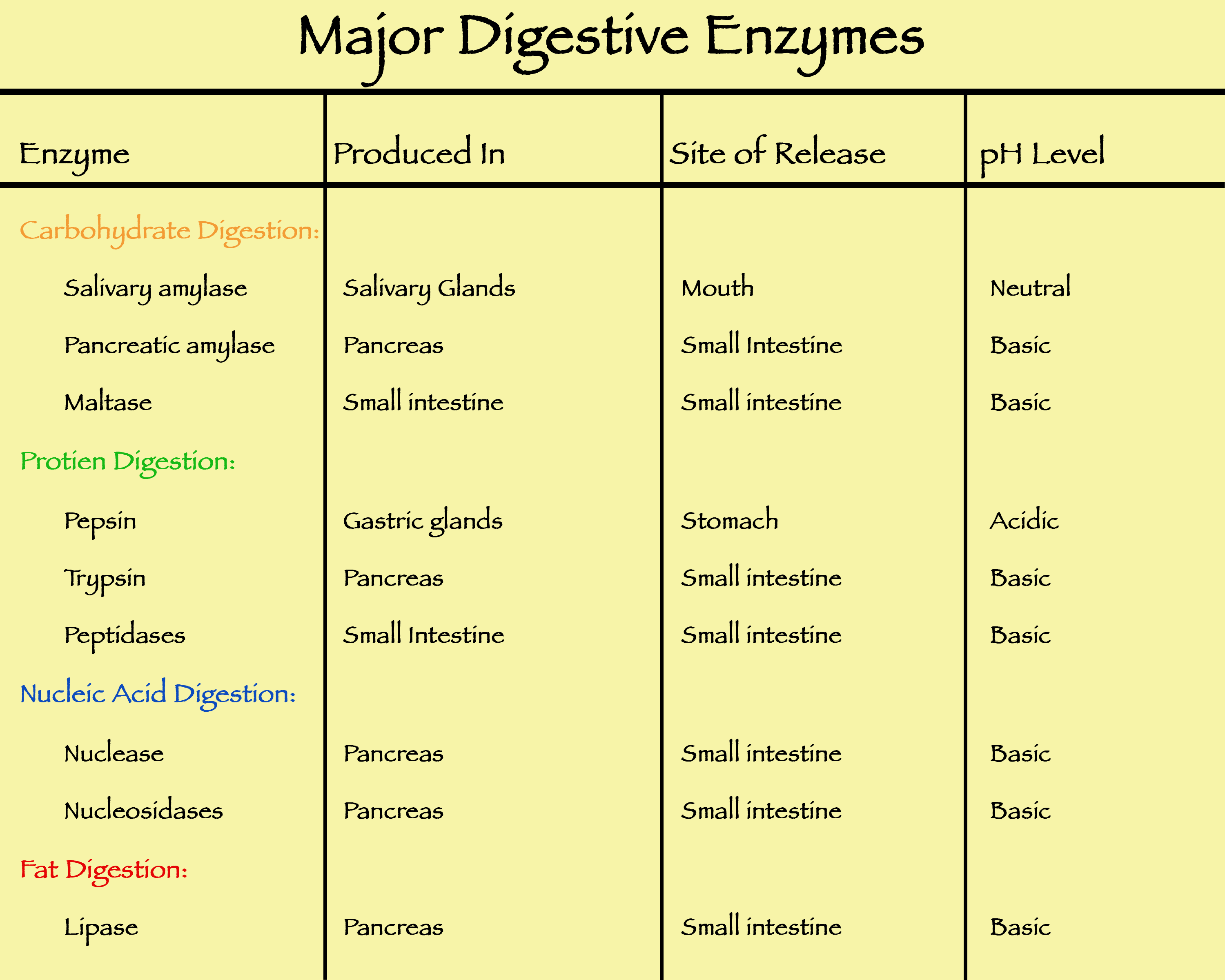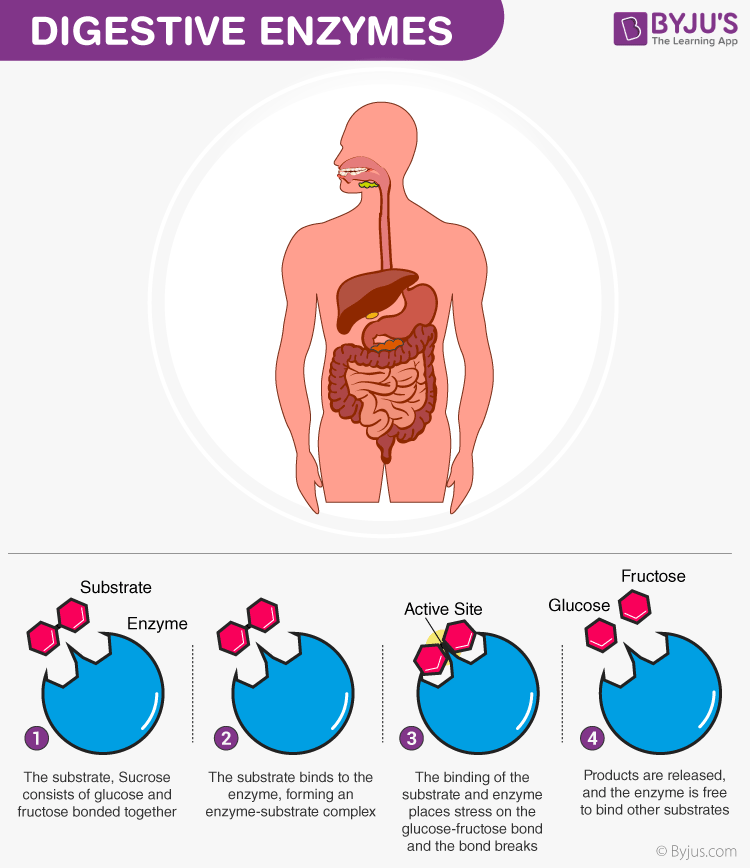Explain the Actions of Different Digestive Enzymes
You would want a combination of alkaline neutral as well as acid based proteases. Digestive Enzymes Each is broken down into its molecular components by specific enzymes.

Digestive Enzymes Deficiency Symptoms Causes And 25 Natural Sources Of Digestive Enzymes Ecosh Life
Other enzymes that help in the digestive process are found in the luminal membranes and the cytoplasm of the cells that lines the small intestine.

. What digestive enzymes do Standard techniques Animal behaviour Cells to systems Exchange of materials. The type of chemical reaction involved as the enzyme functions for example when sucrase acts on sucrose it breaks it into a molecule of glucose and a molecule of fructose. Digestive enzymes are a group of enzymes that break down polymeric macromolecules into their smaller building blocks in order to facilitate their absorption by the body.
A range of practical. Sucrase- Converts sucrose to disaccharides and monosaccharides. Enzymes of the digestive system.
It is the main gastric enzyme. Too much or too little of a certain enzyme can. The three main protease enzymes are trypsin pepsin and chymotrypsin.
Digestion is the breakdown of carbohydrates proteins and fats into small soluble substances to be absorbed into the blood. 5 Pepsin enzyme is secreted by gastric glands 6 Renin enzyme change the liquid milk to solid List of Digestive Enzymes and Functions nd. Enzymes are essential for digestion liver function and much more.
Lipases for example help digest fat. This digestive enzyme is one that can help with the breakdown of plant fibers so. Breaking down food particles during digestion.
Enzymes are proteins that help speed up chemical reactions in our bodies. Maltase- Converts maltose to glucose. Three key types of enzymes in different parts of our digestive system help break down the food to provide the energy our body needs to grow.
Health and disease Energy What digestive enzymes do. Enzymes are produced naturally in the body and help with important tasks including. Enzymes help speed up chemical reactions in the body.
This digestive enzyme acts as an antiseptic agent against some of the non-essential nutrients like bacteria and viruses that might be present in the food. The body performs two main types of digestion. Enzymes only work in certain.
From the stomach the food then. The GI tract is a series of hollow organs joined in a long twisting tube from the mouth to the anus. The action of the.
The hollow organs that make up the GI tract are the mouth esophagus stomach small. Lactase- Converts lactose to glucose and galactose. Different Types of Digestive Enzymes are Produced Inside Stomach they are.
The digestive system is a very intricate system of enzymes and other chemicals that work together to help break up our food into substances that our bodies can absorb and use. It is produced by the stomach cells called chief cells in its inactive form. Mechanical digestion involves the physical breakdown of food such as the action of chewing and chemical digestion involves digestive.
Amylase proteases and lipases are. Special cells produce an enzyme called pepsinogen in your stomach that converts into pepsin when it comes in contact. Digestive enzymes catalyse cause or accelerate a reaction by acting as a catalyst the breakdown of food in the mouth and gut so nutrients are released and can be.
Complex carbohydrates or polysaccharides such as starches are broken down into. They affect every function from breathing to digestion. Your body makes enzymes in the digestive system including the mouth stomach and small intestine.
The largest share is the work of the pancreas.

Digestive Enzymes And Its Types Amylase Protease And Lipase

Question Video Identifying The Organ That Does Not Produce Digestive Enzymes Nagwa

Digestive Enzymes Human Digestive System Biology Lessons Digestive Enzymes
No comments for "Explain the Actions of Different Digestive Enzymes"
Post a Comment